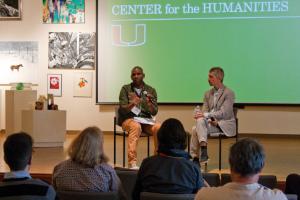How can activists take action to address LGBTQ needs across borders without engaging in the so-called “white-savior industrial complex”? Which strategies will achieve results without exacerbating the very questions of sovereignty that have made LGBTQ rights a politicized contemporary issue? Can scholars and activists forge new connections and engage in intellectual and strategic exchanges to invigorate transnational projects and make LGBTQ lives better? What should “internet activism” become in an era of both instant virtual connectedness and radical inequality? What about issues of class, race, and gender within the U.S.?
 |
| Panelists Kenyon Farrow (left) and Graeme Reid |
Scholars and activists who work on queer and transgender issues came together at the University of Miami, to answer these and other questions during the Thinking Queer Activism Transnationally symposium, hosted by the UM College of Arts & Sciences Center for the Humanities, which aimed to establish strategies for effective cross-border activism.
Speakers discussed the intersection of civil rights, access to care, and the power of rhetoric during apanel that addressed “Counter-Narratives: Taking on ‘Tradition’ and ‘Religion,’” analyzing the ongoing situations in Uganda, Nigeria, and Russia.
Panelist Kenyon Farrow, U.S. and Global Health policy director at Treatment Action Group (an independent AIDS research and policy think tank fighting for better treatment, a vaccine, and a cure for AIDS), stated that “the incorporation of ‘LGBT Equality’ into a conservative political framework can only mean that we will continue to see ‘LGBT rights,’ both domestically and internationally, being used to make racial justice issues a foregone conclusion.”
Referencing his article Afterword: A Future Beyond Equality, he added, “We can be seduced by the international gay travel industry to visit ‘gay friendly’ (and ‘post-racial paradise’) Rio de Janeiro, and say nothing of the massive police violence and genocidal removal of blacks from favelas in preparation for the 2014 World Cup and 2016 Summer Olympics.”
Other panelists included Graeme Reid, director of the lesbian, gay, bisexual and transgender rights program at Human Rights Watch.
A follow-up conversation on Saturday brought together queer youth activists in Miami for an informal discussion focused on the intersection between local and global advocacy. The goal of the follow-up event was to shift the public conversation on queer activism, and engage students and local community members in finding solutions.
The symposium was co-sponsored by the UM College of Arts & Sciences’ Center for the Humanities, Women’s & Gender Studies Program, Modern Languages and Literatures’ Carter Fund, Department of Anthropology, Department of English, Office of Civic and Community Engagement, American Studies Program, Center for Latin American Studies, and Africana Studies Program. It was organized by the Center for the Humanities’ Queer Studies Research Group: Pamela Geller (Anthropology), Brenna Munro (English), Gema Pérez-Sánchez (MLL), and Steven Butterman (MLL & WGS).

